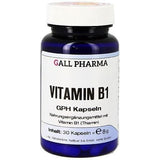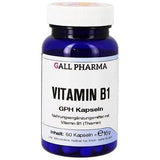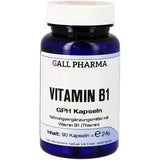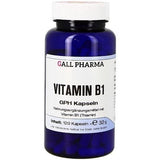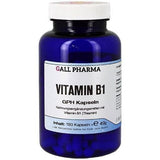VITAMIN B1, thiamine hydrochloride, GPH 1.4 mg capsules
1.4 mg GPH capsules
Vitamin B1 (thiamine) belongs to the group of water-soluble vitamins. This vitamin is particularly essential for the functioning of the nervous system. It is popularly known as the “mood vitamin” or “energy vitamin”. Thiamine is mainly found in potatoes, legumes, wheat germ and nuts. When cooking food, the vitamin is easily destroyed because it is very sensitive to heat.
This Vitamin b1, thiamine hydrochloride performs the following functions:
Thiamine contributes
- contributes to a normal energy-yielding metabolism
- contributes to the normal functioning of the nervous system
- contribute to normal mental function
- contribute to normal heart function
The best-known deficiency disease is Beri-Beri. This manifests itself in a disturbance of the nerve cells and muscle cells (e.g. heart muscle cells). For many people, vitamin B1 is an indispensable help in coping with stressful situations such as illness, after surgery or anxiety. An increased need also arises from the influence of caffeine, smoking and the consumption of sweets.
Recommended Vitamin b1 deficiency, thiamine hydrochloride dosage:
Adults: Take 1 capsule once a day with liquid.
1 capsule contains 1.4 mg vitamin B1 (127% NRV*).
*NRV = Percent of the Recommended Daily Allowance
Notes:
Gluten-free. Lactose free. Yeast Free.
Raw material Vitamin b1 deficiency, thiamine hydrochloride description:
Thiamin HCl is synthetically manufactured and meets the requirements of the European Pharmacopoeia. The gelatine used in the hard gelatine capsules is BSE/TSE-tested pharmaceutical gelatine.
Ingredients:
Bulking agent: mannitol (excessive consumption can have a laxative effect!); thiamine HCl (0.6%); capsule shell: gelatin; Colorant in the capsule shell: Titanium dioxide
food supplements Vitamin b1 deficiency, thiamine hydrochloride are not a substitute for a balanced and varied diet and a healthy lifestyle.
Vitamin b1 deficiency, thiamine hydrochloride dietary supplements. The recommended daily consumption must not be exceeded.
Dietary supplements Vitamin b1 deficiency, thiamine hydrochloride are not a substitute for a balanced, varied diet and a healthy lifestyle.
Keep away from children!






